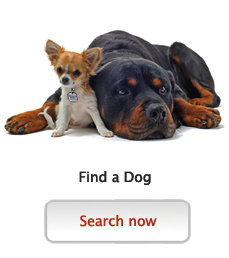How to find a new home for your dog
|
No matter how much people love their pets and act as brilliantly responsible, caring owners, there may come a time when they can find themselves struggling to provide a good quality of life for their dog. Dogs need shelter, food and exercise above all else – while we may adore our dogs, if we can’t provide them with these basic necessities then we can’t give them the right level of care.
Dogs are given up for a wide range of reasons and while they are sometimes avoidable there can be an unforeseen change of circumstances which means you are unable to keep your dog. No everyone who has to give up their dog is a bad owner; by making sure your dog goes to a loving, forever home you can ensure that your dog will be well taken care of, even when he leaves your care.
Realising that you have to find your dog a new family to live with and reacting in a positive way will save both you and your dog a lot of heart ache. It is possible to create a smooth transition for your dog as it enters its new home.
Don’t wait for the situation to become desperate. If you wait till the last minute then your dog may end up in a shelter. However, with some forward planning you can give your dog a trustworthy, loving family home.
How to find a new home for your dog
With some forward planning you can find the perfect new home for your dog. By looking for new owners yourself, you can afford to fully vet any interested people and ensure that the pet you love will be safe, happy and well taken care of. It may seem like a daunting task, but you well sleep easier knowing that your dog is in good hands.
Places to search for your dog’s new home:
Noah’s Dogs – Here at Noah’s Dogs we want to make sure that dogs don’t have to needlessly end up in a shelter or without a home. Why not put your dog in front of the entire Noah’s Dogs community – a community filled with dog lovers – and see if they would like to give your dog a new home? Your dog’s new family could be right under your nose!
Breeder – If you bought your dog from a breeder, they should be the first people you contact when you’re looking to rehome your dog. Many good breeders guarantee that they will take the dog back if you can’t look after it anymore. They will want to make sure that your dog ends up in a good home just as much as you do and if they don’t take them in themselves, they may help you find a new owner.
Friends and family – It can be tempting to ask a friend or family member to take your dog in. However, it is important that the dog and friend are compatible with each other. Just because they make a good friend, doesn’t mean they’ll make a good dog owner. Choose someone who is responsible, reliable and is already considering getting a dog. You shouldn’t have to try and persuade anyone into owning your dog.
Contact charities – The Blue Cross Home Direct Service will work with you to help you find a new home for your dog. They will keep your dog’s details on record and let you know if they find any suitable potential owners, as well as thoroughly vetting them. This service allows you to keep your dog until they find him a new home, so your dog doesn’t need to go through the stress of spending time in a shelter.
Breed Rescue Organisations – If your dog is a pedigree there may be a rescue organisation dedicated to rehoming his breed. Some breed rescue clubs have long waiting lists full of potential new owners just waiting to give your dog a new home, particularly for rarer breeds.
Visit shelters – If you don’t have much time or are struggling to find a new home for your dog on your own, then get in touch with a shelter or rescue centre. Don’t feel ashamed or embarrassed about your situation – shelters should understand that you are doing your best to find a good new owner for your dog and will want to help you. Be honest with them about your situation and don’t be afraid to admit you need their help. By talking to them, you can give the staff at the shelter a detailed history of your dog, the type of household he is used to and the family unit he is familiar with, as well as any medical issues the dog may have. These details will go a long way in helping the shelter rehome your dog. In addition, by visiting shelters yourself you can inspect them and check their quality, should your dog have to stay there.
Classifieds and Internet listing sites – The classifieds adverts in newspapers and online are often the first place people go to find their dogs new owners. However, this is a risky option and you should proceed with caution. Be sure to vet any enquirers thoroughly and use well known, reputable sites. Unscrupulous owners and puppy farmers will often use classifieds ads to find free or cheap dogs from vulnerable people in a desperate situation.
Making sure the new home is right:
Once you have started receiving enquiries about your dog, it’s time to begin the process of vetting your applicants. Potential new owners should be vetted in order to make sure they are responsible, ready for a dog and understand the implications of dog ownership. Conduct interviews, ask for a personal reference or a reference from a local vet, meet them in person or do a home check – but always make sure you never meet them alone.
While conducting your interviews, ask the following questions and look out for certain answers which may indicate a good or bad owner.
1. Why do you want a dog? If the applicant give an answer such as ‘I’ve always wanted the companionship of a dog and now feel I am in a good position to own on’ it indicated that they are responsible and have seriously considered getting a dog, rather than rushed into it. However, if they give an answer like ‘the kids keep asking for one’ it shows that they are making an impulse or emotional decision and may not in fact be ready for the commitment.
2. Have you previously had a dog, what happened to it? In an ideal world you’ll be told that ‘yes I had a dog, but it died of old age’. This shows that not only does the potential owner have experience with dogs, but they took care of it throughout its life and gave it all the care it needed. A bad answer is that they had a dog but it ran away or was hit by a car, because it shows that they may be irresponsible owners.
3. Do you have any pets now? It is always reassuring to hear that the person you’re interviewing has pets, or has had pets in the past. This shows they are animal lovers and have experience of caring for animals. You will want to look out for people who have never owned any pets, as it is a big jump from never having taken care of even a small animal to looking after a dog.
4. If you have dogs are they spayed/neutered? A responsible owner will say yes, but if they say no then tread carefully. Some owners insist that they don’t believe in neutering as they think it is cruel, but any good dog owner knows that not neutering or spaying your dog leads to reckless breeding and unwanted puppies.
5. Is the pet for you? The only answer you want here is yes. If they are planning on buying the dog for someone else and it’s a present, there’s no way to know how well the dog will be looked after.
6. How long will the dog be left on its own during the day? The best answer is that the dog will spend very little time alone; perhaps the owner works from home or will be able to take the dog into their office. If the interviewee works long hours and is rarely at home during the day, it won’t be good for the dog.
7. What kind of training will you use, particularly in correction? Good potential owners will do their research and will understand that positive reinforcement and reward based training is the best way to train a dog. You want to avoid anyone who says they will shout, smack, or humiliate the dog into good behaviour, for example by rubbing it’s face in its own dirt if the dog messes inside the house.
8. How much time will you dedicate to exercising the dog? Well informed owners will be able to give the dog as much exercise as its breed requires and always make time for walking the dog, every day. Anyone who doesn’t understand that daily exercise is a vital part of owning a dog should be dismissed. A leisurely Saturday morning walk just won’t cut it!
9. Do you have experience of the breed? The perfect answer would of course be ‘Yes I have owned this breed before’, but you shouldn’t dismiss people who haven’t owned the breed if they seem knowledgeable and informed. If anyone answers ‘I’ve never heard of it, but it looks cute’ then it’s time to make your goodbyes – a dog shouldn’t be bought just on the basis of its looks.
10. Are you allowed dogs in your home’s lease? People who are serious about owning a dog will have checked that they are entitled to own a dog in their lease, or will have written permission from their landlord. Anyone who says that they are not allowed a dog but will make sure their landlord or property developer doesn’t find out, should be avoided at all costs. As well as asking the general questions above, you should make sure you ask about any issues which will be important to your dog’s breed. For example, if you’re looking to rehome a St Bernard you’ll want to ask if the potential owner has a large home. If your dog sheds a lot, you may want to ask if anyone in the new family has allergies. Think carefully about what kind of home you want your dog to live in, and ask suitable questions which will help you find out if the person you’re interviewing can provide it.
|
- There are no comments yet









